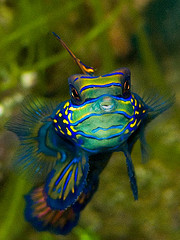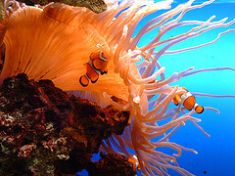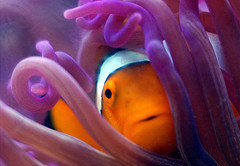The basic nutrients required by saltwater fish include protein, lipids, carbohydrates, vitamins and minerals.
Like all other living animals, they too have dietary requirements.
The exact requirements of each species are not known and are poorly understood.
But research has provided basic guidelines for feeing saltwater aquarium fish.
Proteins
It is important to maintain the normal growth.If the saltwater fish diet is low in protein, growth rates, tissue repair, and disease resistance are affected.
Younger fish requires more protein in their diets than older ones.
Lipids (fat)
Lipids, commonly known as fats or fish oils are critical portion of the diet.
These are used as energy sources and are required for the synthesis of various components of the saltwater fishs body.
Carbohydrates
They are broken down into units of glucose, which is major source of energy. They can also be converted to lipids for energy storage.
It is important because it is essential for the conversion of amino acids and fats into various other components required for normal functioning.
While carbohydrates are an important part of the fishs diet, not all can utilize its efficiency. Fresh water fish are efficient users and saltwater fish are not.
So, carbohydrates should not be a large part of your saltwater fishs diet. Large amount of carbohydrates in the diet can cause liver degeneration and diet-related diseases.
Fiber
Fiber is the indigestible portion of a food.
Most fiber in fish diets is derived from plant material and majority of commercial dry food include plant materials.
There is no guideline established for the amounts of fiber in a saltwater fishs diet. But, it is believed that high amount will impair the proper digestion of other nutrients in a diet which results to less nutrients intake.
Vitamins
Vitamins are required in the diets of ALL fish, not only saltwater!
They provide the necessary ingredients for proper metabolism and skeletal stability.
As with other nutrients, the requirements for vitamins vary with the species of fish, size and age, water temperature amount of stress in the environment, diet, and other related factors.
Signs of saltwater fish that has less vitamin intake are weight loss, slow growth, loss of pigmentation, blindness, and increased chances to diseases and infections.
Minerals
Like vitamins, minerals also provide the necessary ingredients for proper metabolism and skeletal stability.Fish are capable of absorbing some minerals directly form their environment.
Since saltwater fish swallow small amounts of water in the aquarium, they are ingesting minerals beyond their minimum requirements.
Iodine deficiency is the most common mineral deficiency in the saltwater fish diets. Calcium and phosphorous are required for normal growth. Lack of these can cause they spine to curve and deformed skulls in fish.
Related Article:
 Saltwater Fish Nutrition
Saltwater Fish Nutrition



